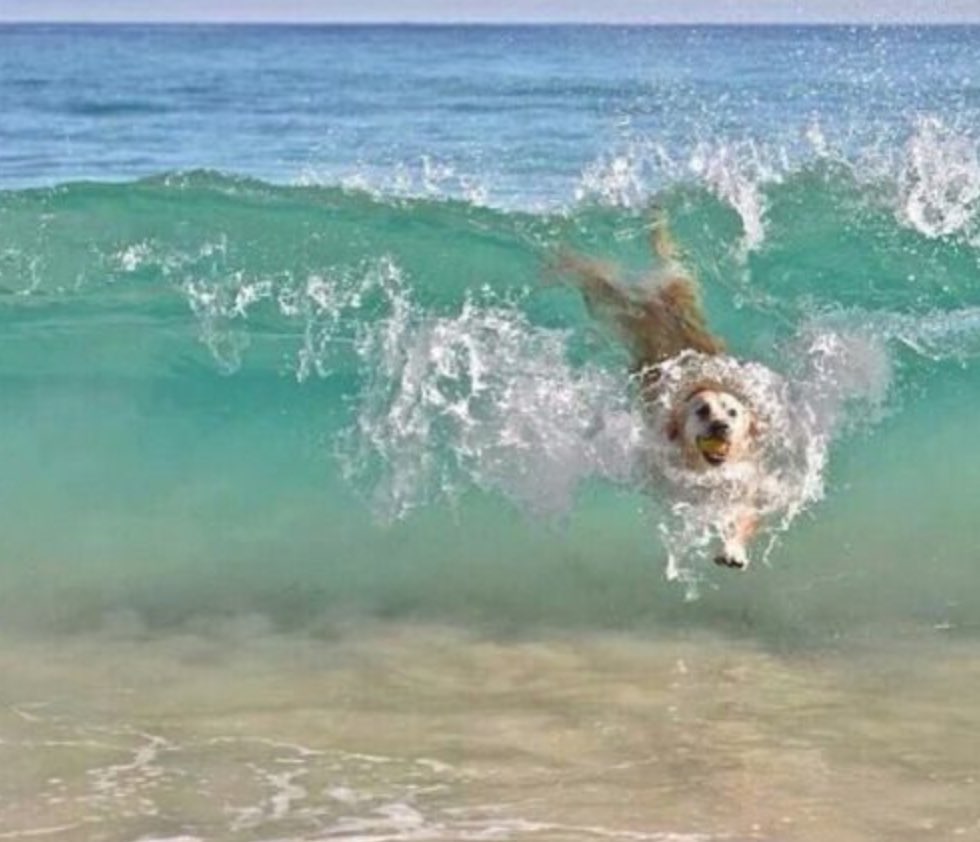Dog sunscreen
Dog sunscreen is not such a silly concept.
It can be a valid solution for your dog, depending on a few circumstances.
 Dog joy! No sunscreen required?
Dog joy! No sunscreen required?If you have experienced a sunburnt skin you'll know just how really unpleasant it can be.
In extreme cases it can be painful for many days, where your skin peels off in multiple layers and in rare cases you can get a high fever.
And of course then there is the real fear of skin cancer.
Your dog can get sunburnt and suffer in the same way,
just as they too can get skin cancer.
Dog sunscreen and skin cancer
Many people rely on slathering sunscreen all over exposed skin before going outdoors for extended time in the sun, whether to work, play or just plain relax.
So how about considering doing the same for your dog?
Dog sunscreens are becoming increasingly popular as the occurrence of skin cancer is becoming more commonly diagnosed for dogs.
Without any medical assistance, complications from these skin cancers typically end up in painful deaths.
Dogs most commonly using dog sunscreen
The following dogs more regularly experience skin issues, that are helped through the regular use of a dog sunscreen:
- Boxers, Dobermans, Bull Dogs, Pit Bull Terriers, Bull Terriers, Scottish Terriers, Bichons, Poodles, Schnauzers, Bull Mastiffs, Basset Hounds, Weimaraners, Kerry Blue Terriers, Norwegian Elkhounds. Many of these are breeds predisposed to skin tumors.
- Those that they are regularly shaved, making the shaved areas more at risk of being sun burned.
- Pale-nosed or white-nosed dogs are prone to sun-induced tumors in those areas.
- Dogs that like to sunbathe on their backs can also get tumors in the inguinal area, (the space between the back legs).
Ultimately, if your dog has any area where the skin is thin, without sufficient hair cover, you should look at ways to protect them from sunburn. Susceptible areas include:
- Ears and ear tips
- nose including bridge
- skin surrounding the lip/mouth area
- exposed belly
- shaved areas
- all over if coat is short, fine, or white/light in color and skin is fair
Just as with us humans, for sunscreens to be effective, make sure to re-apply after swimming or being in contact with water.
How to choose a sunscreen for your dog?
There are sunscreens designed especially for pets, but to a large degree people will choose to share their own sunscreen with their dog instead of buying a dog sunscreen.
If you are in the habit of seeking a non-toxic, healthy sunscreen, in just the same way as it benefits you in that it is free of toxic chemicals that have potential harmful effects on your health, mostly this will also apply to your dog.
However, it is also important to know that just because a sunscreen has been made 'specifically for dogs' there is also a good chance they use the very same sunscreen ingredients used in human sunscreens that many consider to be toxic!
I found one sunscreen called Epi-Pet Sun Protector Sunscreen that claims to be the "ONLY pet sunscreen that meets the FDA guidelines for ingredient stability and is effective in blocking both UVA and UVB sun rays." It contained the following ingredients that I choose not to use for myself, so wouldn't dream of using on my dog!:
- Ethylhexl Methoxycinnamate (Sunscreen) - said to be estrogenic (gender bending)
- Homosalate (Sunscreen) - said to be a hormone disrupter and forms toxic metabolites
- Benzophenone-3 or Oxybenzone (Sunscreen) - many experience allergic skin reactions and said to be a hormone disrupter
- Octyl Salicylate (Sunscreen) - this is a 'penetration enhancer' which effectively can direct the other chemicals into the blood
- Parfume (vanilla) - in general these are considered very toxic. Besides, I am not sure my dog would appreciate smelling of vanilla?
Epi-Pet dog sunscreen also instructs that it is "NOT FOR USE ON CATS, as Epi-Pet Sun Protector Sunscreen is safe if licked only once it is applied to the skin". My interpretation here was that as these sunscreen ingredients are chemical, they are only effective after having penetrated the skin, so they wouldn't work for a cat, as they would very efficiently lick it off before it had a chance to penetrate. Why this doesn't apply to dogs I am not sure though, as they would lick it off too!
Human vs dog skin
If you've ever wondered why you're not supposed to use human shampoo on a dog, the reason is simple - dogs and humans have different skin.
I think it helps to know a little how human skin and dog skin are different. Both dogs and humans have a similar skin structure with an epidermis layer and a dermis layer, but we do have significant differences:
- pH levels
Human skin is around 4.5 - 5, which is quite acidic.
As a baby we have a pH a lot more alkaline, or neutral, at around 7.
The better the acid mantle on our skin, the better protected we are from germs.
Hence as a baby we need that much more protection from germs and our skin is that much more senstitive.
Dogs have a pH around 7 - 8.5, which is why some people will choose baby products like shampoo to use on their dog if they can't find a dog specific brand.
In general, the more alkaline or basic the skin, the more susceptible it will be to infections. - Hair
Another key difference is that dogs have a bundle of hairs growing from one hair follicle where humans have one.
For extra protection from germs as well as the sun, dogs have their hair.
We seem to have lost this as we evolved but some say the darker pigmentation of our skin is what we developed for the sun protection instead - especially those living in Africa.
When a dog is missing hair, as with ones that are shaved or are naturally hairless, they commonly have skin problems, including sun burn. - The epidermis
This is the body's environmental shield, that works as a barrier against injury, disease, and damage from ultraviolet light and is constantly replaced.
Canine epidermis has a turnover rate of 20 days compared to humans which occurs approximately every 28 days.
The epidermis of a dog is 3-5 cells thick however in humans it is at least 10-15 cells thick.
But while you should look to protect your dog's sensitive areas, they do not need any dog sunscreen coverage over their hair.
As humans we can choose to go out and bake in the sun all day long if we want to, preferably with great sun protection.
But animals are built for this naturally in that they wear their own protective clothing all day, every day with their wonderful coat of hair.
It's the few exposed spots that become difficult or unusual cases as described above, that need additional help.

Also, where you have a dog that has a thick skin and/or a thick coat of hair, like a Labrador or Retriever that is built to be able to swim long distances in the cold, the only exposed skin you will see are the pads and the nose.
Both may be susceptible to over doing the sun exposure but are difficult areas to protect with something like dog sunscreen, so require your being mindful and looking after them if outdoors often.
How to choose your dog sunscreen
As mentioned, there are sunscreens specifically created for different animals, but just because they are created specifically doesn't necessarily make them safe.
In a similar way where sunscreens that are said to be made specifically for children that are really no different to the sunscreens for adults, I believe you need to look into the ingredients before accepting them as healthy options.
All chemical based sunscreens need to be absorbed by the skin before they can become effective and for this reason, I avoid using them. What's not good for me is definitely not good for my dog!
Buying a physical based sunscreen (ie. zinc oxide or titanium dioxide) can present some problems in that they are designed to sit on the surface of the skin to reflect the sun's UV rays and as such can be licked off by your dog!
Zinc:
- Is actually an essential mineral for the health and fitness of a dog, or human. Nowadays, zinc supplements are added to dog foods, in order to keep them fit.
- However, zinc poisoning is a case where an excess amount of zinc is ingested into the dog's body, leading to severe complications.
- Zinc deficiency in dogs is common but cases of zinc toxicity are rare.
A toxic dose for a dog is considered to be between 50 to 100 mg/kg. One whole 100 ml tube will contain a maximum of 25 mg of zinc oxide and you may use about an eighth of that.
In severe cases of zinc poisoning, a dog can face issues of acute kidney failure plus liver damage.
Titanium dioxide on the other hand is not something one wants to 'eat' at all.
Both these physical sunscreens are fine to put onto animals such as horses, pigs or baby elephants - all of which I have had requests for help with sun protection from people looking after them, as they cannot lick it off. They could perhaps rub it off but are not likely to eat it!
Many people choose a sensitive skin or baby sunscreen with the lack of a dog sunscreen, but once again, I hesitate to recommend any chemical based dog sunscreen. EG. A Dr. Mark Macina, Animal Medical Center's dermatologist, said he found Bullfrog sunscreen, SPF 15 or higher, works well for animals. However, I don't like many of their ingredients:
- the chemical sunscreens - Avobenzone, Homosalate, Octisalate, and Octocrylene
- other ingredients - Propylene Glycol, Propylparaben, Fragrance
And as I said, I wouldn't choose to wear this sunscreen, so why should my dog?!
So the bottom line is that it really is quite difficult to choose a dog sunscreen - the best sunscreens being the physical ones, as long as they don't contain any other nasty ingredients. But the difficulty will lie in applying them.
However, while it is said that you should protect your dog or cat's sensitive areas, remember they do not need additional coverage over their hair! We humans go out and bake all day, but animals are wearing their own hat.
"It's really this couple of spots that are a problem," Dr Ann Hohenhaus said. "You don't need to apply it all over, you'll only be making your pet sticky."
References for dog sunscreen
Dr. Ann Hohenhaus, chairman of the Department of Medicine at the Animal Medical Centre of New York




New! Comments
Have your say... please leave me a comment in the box below.